Why Central Indiana Businesses Need Trusted EV Charging Station Contractors
EV charging station contractors are specialized electrical professionals who handle the complete installation process for electric vehicle charging infrastructure, from initial site assessment through ongoing maintenance and support.
Top EV Charging Station Contractor Services:
- Site assessment and electrical load analysis
- Permitting and utility coordination
- Design-build project delivery
- Equipment procurement and installation
- Commissioning and testing
- Ongoing maintenance and monitoring
With 25% of vehicles expected to be electric by 2025, Indianapolis businesses and property owners are scrambling to prepare their parking lots for the electric future. The challenge isn’t just buying a charger – it’s navigating complex permitting, coordinating with utilities like Indianapolis Power & Light, and ensuring your electrical system can handle the increased demand.
Smart property owners know that EV charging attracts tenants and customers while positioning their business as forward-thinking. But attempting a DIY approach or hiring the wrong contractor can lead to code violations, utility delays, and frustrated drivers staring at broken chargers.
The key is finding contractors who understand both the technical requirements and the business benefits of EV infrastructure. From Level 2 workplace charging for employee retention to DC fast charging for retail customer convenience, the right contractor makes all the difference.
I’m Clay Hamilton, President of Grounded Solutions, bringing over two decades of electrical expertise to Central Indiana’s growing EV infrastructure needs. As an active member of the Central Indiana Independent Electrical Contractors and having worked extensively with EV charging station contractors throughout the region, I’ve seen what separates successful installations from costly mistakes.
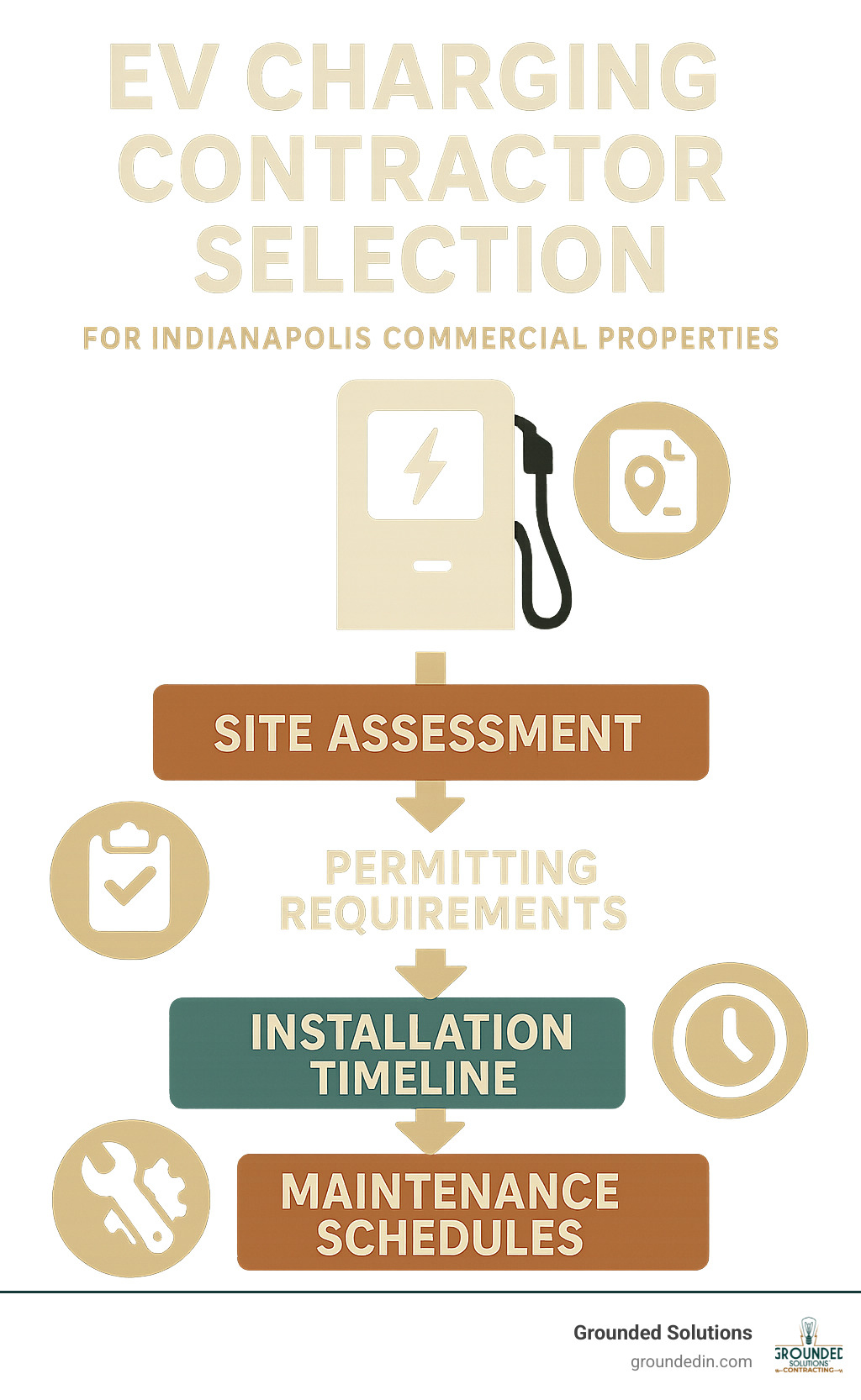
Ready to explore EV charging for your property? Contact Grounded Solutions today for a comprehensive site assessment and find how we can transform your parking lot into a competitive advantage.
EV charging station contractors terminology:
- EV Charger Installation Indianapolis
- Electrical contractor Indianapolis
- Electrician for Tesla charger
EV Charging Station Contractors: 10 Critical Services They Provide
Not all electricians are created equal when it comes to EV infrastructure. While your local electrician might be great at installing ceiling fans, EV charging station contractors bring specialized expertise that makes the difference between a smooth installation and a costly nightmare.
The reality is that EV charging projects involve way more than just running wire to a parking lot. From navigating utility red tape to configuring smart charging software, these installations require contractors who eat, sleep, and breathe electric vehicle infrastructure.
Here’s what separates true EV charging station contractors from general electricians: comprehensive site assessment and energy analysis, detailed load studies that prevent electrical overloads, turnkey design-build services that keep projects on track, expert permitting navigation through Indianapolis bureaucracy, seamless utility coordination with IPL and other providers, strategic hardware procurement from trusted manufacturers, professional software configuration for network management, thorough commissioning and testing protocols, ongoing maintenance programs that keep chargers running, and detailed performance reporting that tracks your investment’s success.
Site Assessment & Energy Analysis
Real EV charging station contractors show up with load meters, measuring tapes, and years of experience spotting potential problems before they become expensive surprises.
We start every Central Indiana project by understanding your parking lot layout and how people actually use the space. Are you dealing with employee parking that sits for eight hours, or customer turnover every thirty minutes? This affects everything from charger placement to power requirements.
Power availability analysis goes way deeper than checking if you have empty breaker slots. We’re measuring actual electrical loads throughout the day, calculating future demand, and making sure your transformer won’t throw in the towel when everyone plugs in after lunch.
ADA compliance isn’t optional, and it’s not something you figure out after the concrete is poured. Accessible charging spaces need proper dimensions, clear pathways, and equipment mounted at the right heights.
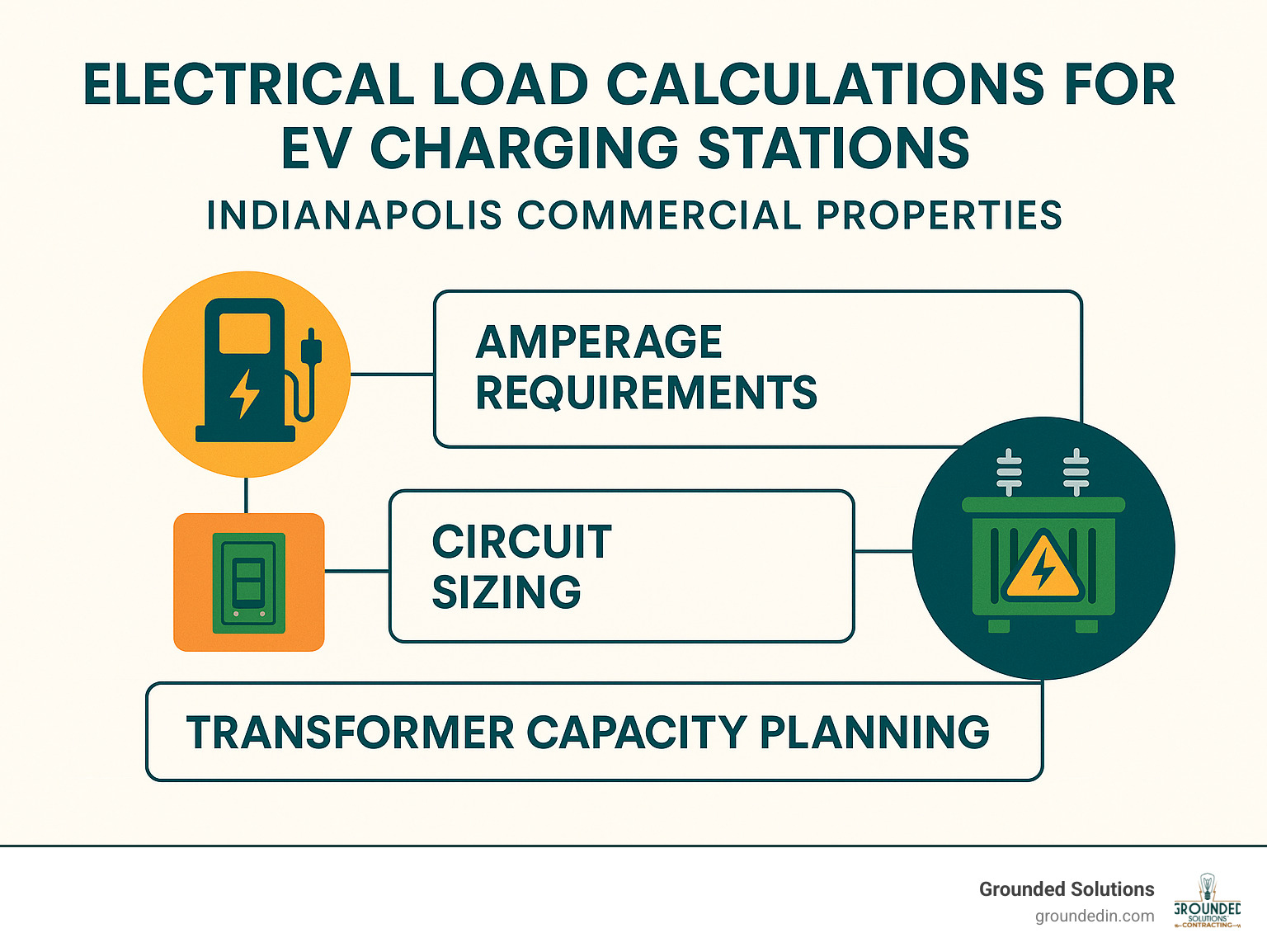
Permitting & Utility Coordination with EV Charging Station Contractors
Experienced EV charging station contractors handle the bureaucratic maze so you can focus on running your business.
Indianapolis plan review processes have their own quirks and timelines. We know which reviewers prefer detailed load calculations versus simplified drawings, and how to structure submissions that move through the system efficiently.
Interconnection paperwork with Indianapolis Power & Light involves more than filling out forms. Utility engineers need to understand your project’s impact on their grid, especially for larger installations that might require transformer upgrades or service modifications.
Inspector meetings go smoother when contractors have established relationships and understand local interpretation of electrical codes. We schedule inspections strategically to avoid delays and address any concerns before they become project stoppers.
Turnkey Design-Build Delivery by EV Charging Station Contractors
The best EV charging station contractors don’t just install equipment – they take complete ownership of your project from concept to completion. This means one point of contact, one contract, and one team accountable for results.
Our civil drawings aren’t just pretty pictures. They’re detailed construction documents that show exactly where conduit runs, how bollards get installed, and where concrete gets cut. These drawings prevent field surprises that blow budgets and delay schedules.
In-house electricians make all the difference in quality control and accountability. When our team installs your charging stations, we’re not coordinating with unknown subcontractors who might disappear when problems arise.
Fast-track schedules become possible when design and construction teams work together from day one. Instead of waiting for separate design completion before construction can start, we overlap phases and identify long-lead items early to compress overall timelines.
When you choose turnkey delivery, you’re getting a partner who’s invested in your project’s success rather than a contractor who just wants to finish their piece and move on.
Choosing the Right Charger Level for Your Property
Picture this: you’ve decided to add EV charging to your Indianapolis property, but you’re staring at a confusing maze of technical specs and voltage numbers. Should you go with Level 1, Level 2, or jump straight to DC fast charging? The answer depends entirely on how your customers and tenants actually use your space.
Think of it like choosing between a coffee pot, espresso machine, or industrial brewing system. Each serves coffee, but the right choice depends on who’s drinking it and how quickly they need their caffeine fix.
Level 1 charging uses regular 120-volt household outlets and crawls along at 3-5 miles of range per hour. Most EV charging station contractors rarely recommend Level 1 for commercial properties unless you’re talking about emergency backup situations.
Level 2 charging steps up to 240 volts and delivers 15-30 miles of range per hour. This is the sweet spot for most Central Indiana businesses. Your employees can plug in during their 8-hour workday and head home with a full battery, while your tenants can charge overnight without stress.
DC fast charging is the heavyweight champion, pumping out 150+ miles of range in just 30 minutes. But it requires serious electrical infrastructure – think transformer upgrades and load management systems that can make your utility bill spike if not handled properly.
The secret sauce is matching charging speed to dwell time – how long vehicles actually sit in your parking spaces. A quick-service restaurant needs different charging than an apartment complex, and experienced contractors understand these nuances. More info about commercial installs can help you think through your specific situation.
| Charger Type | Voltage | Charging Speed | Amperage Range |
|---|---|---|---|
| Level 1 | 120V | 3-5 miles/hour | 12-16 amps |
| Level 2 | 240V | 15-30 miles/hour | 16-80 amps |
| DC Fast | 480V+ | 150+ miles/30 min | 125+ amps |
Level 2 for Workplaces & Multi-Unit Dwellings
Level 2 charging is like that reliable friend who always shows up on time – not flashy, but gets the job done perfectly. For Indianapolis workplaces and apartment buildings, it’s often the ideal choice because it matches how people actually live and work.
Think about your typical employee’s day. They arrive at 8 AM, park their car, and don’t touch it again until 5 PM. That’s nine hours of potential charging time – more than enough for a Level 2 charger to top off even the largest EV battery.
The J1772 connector is the universal standard for Level 2 charging, working with every electric vehicle on the market (Tesla drivers just need their included adapter). This compatibility means you’re not excluding potential employees or tenants based on their vehicle choice.
For multi-unit dwellings, Level 2 charging supports overnight charging schedules perfectly. Residents plug in when they get home from work, and their car charges while they sleep. More info about smart charging explores how intelligent systems can optimize power usage across multiple charging stations.
DC Fast for Retail & Transit Fleets
DC fast charging is where things get exciting – and complicated. If Level 2 is like a steady marathon runner, DC fast charging is the sprinter that leaves everyone else in the dust.
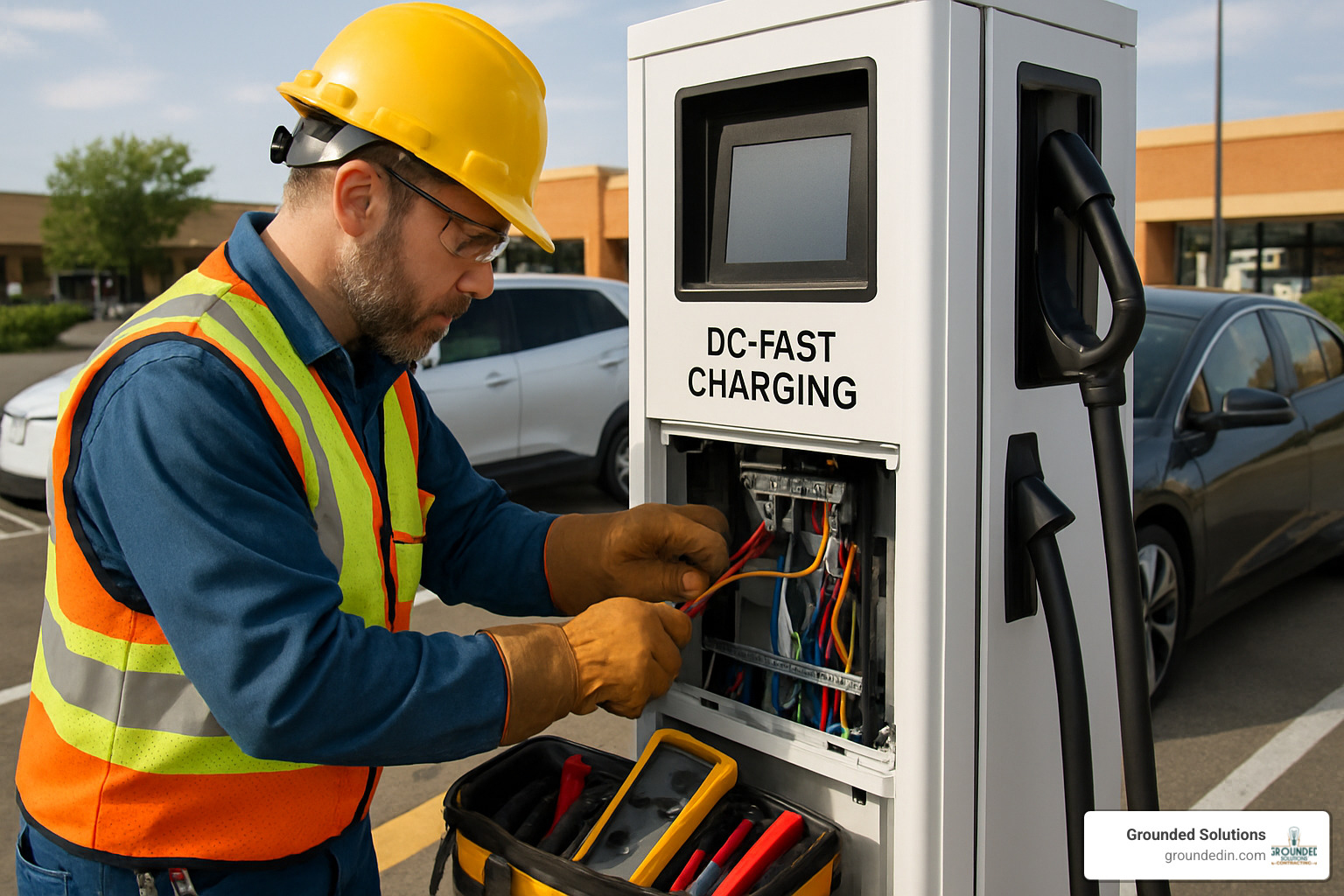
Retail locations love DC fast charging because it matches customer behavior. Someone stopping for groceries or grabbing lunch doesn’t want to wait three hours for their car to charge. They want meaningful range added during their 20-30 minute visit, and 150kW+ systems deliver exactly that.
But here’s where many property owners get sticker shock. DC fast charging isn’t just about buying a bigger charger – it often requires transformer upgrades, new electrical service, and sophisticated load management systems to prevent demand charges from destroying your utility budget.
Fleet applications represent another major opportunity for DC fast charging. Transit fleets switching to electric buses need rapid charging during route breaks. Delivery companies require midday top-ups to keep vehicles running all day.
The electrical infrastructure requirements are substantial, but the payoff in customer satisfaction and operational efficiency makes DC fast charging worthwhile for the right applications.
From Permits to Plug-In: The Central Indiana Installation Timeline
When Indianapolis business owners ask about EV charging installation timelines, I always tell them the same thing: good projects take time, but rushed projects take even longer. After managing dozens of commercial installations across Central Indiana, we’ve learned that realistic expectations prevent frustration and budget overruns.
Most EV charging station contractors promise unrealistic timelines because they don’t account for utility coordination delays or permit review backlogs. Here’s what actually happens during a typical commercial installation:
The first two weeks are all about getting the foundation right. We conduct our thorough site assessment, analyze your electrical capacity, and help you select the right equipment for your specific needs.
Weeks three through six involve the paperwork marathon. We submit permit applications to local building departments, coordinate interconnection agreements with Indianapolis Power & Light, and handle load impact studies for larger installations.
Construction happens during weeks seven through ten. This includes trenching from your electrical panel to charger locations, installing conduit and wiring, mounting equipment, and adding protective bollards around charging stations.
Week eleven focuses on inspections and commissioning. Municipal electrical inspectors verify code compliance, utility representatives approve final interconnection, and we test all systems thoroughly.
Go-live happens around week twelve with network activation, billing system setup, and user training. We also install final signage and help with any marketing announcements about your new charging capabilities.
More info about residential upgrades covers similar processes for home installations, though residential projects typically move faster due to simpler permitting requirements.
Safety, Codes, and Future Scalability
Every EV charging installation we complete follows National Electrical Code Article 625 requirements, but we go beyond minimum standards to ensure long-term reliability and safety. Code compliance isn’t just about passing inspections – it’s about protecting your investment and the people using your charging stations.
UL listing requirements apply to all charging equipment, but not all contractors understand the nuances. We only install certified equipment from manufacturers with proven track records in commercial applications.
ADA accessibility standards require careful planning of parking space layouts and charger placement. The charging cable must reach the vehicle’s charging port without creating trip hazards or blocking accessible pathways.
Future scalability drives every design decision we make. Installing oversized conduit costs little extra upfront but saves thousands when you want to add more chargers later. We typically install 2-inch conduit even when 1-inch would meet current needs.
Renewable & Storage Integration
Solar canopies over EV charging stations create a compelling combination that appeals to environmentally conscious customers while reducing your operating costs. We’ve designed several solar-plus-EV installations across Central Indiana, and the economics keep improving as equipment costs decline.
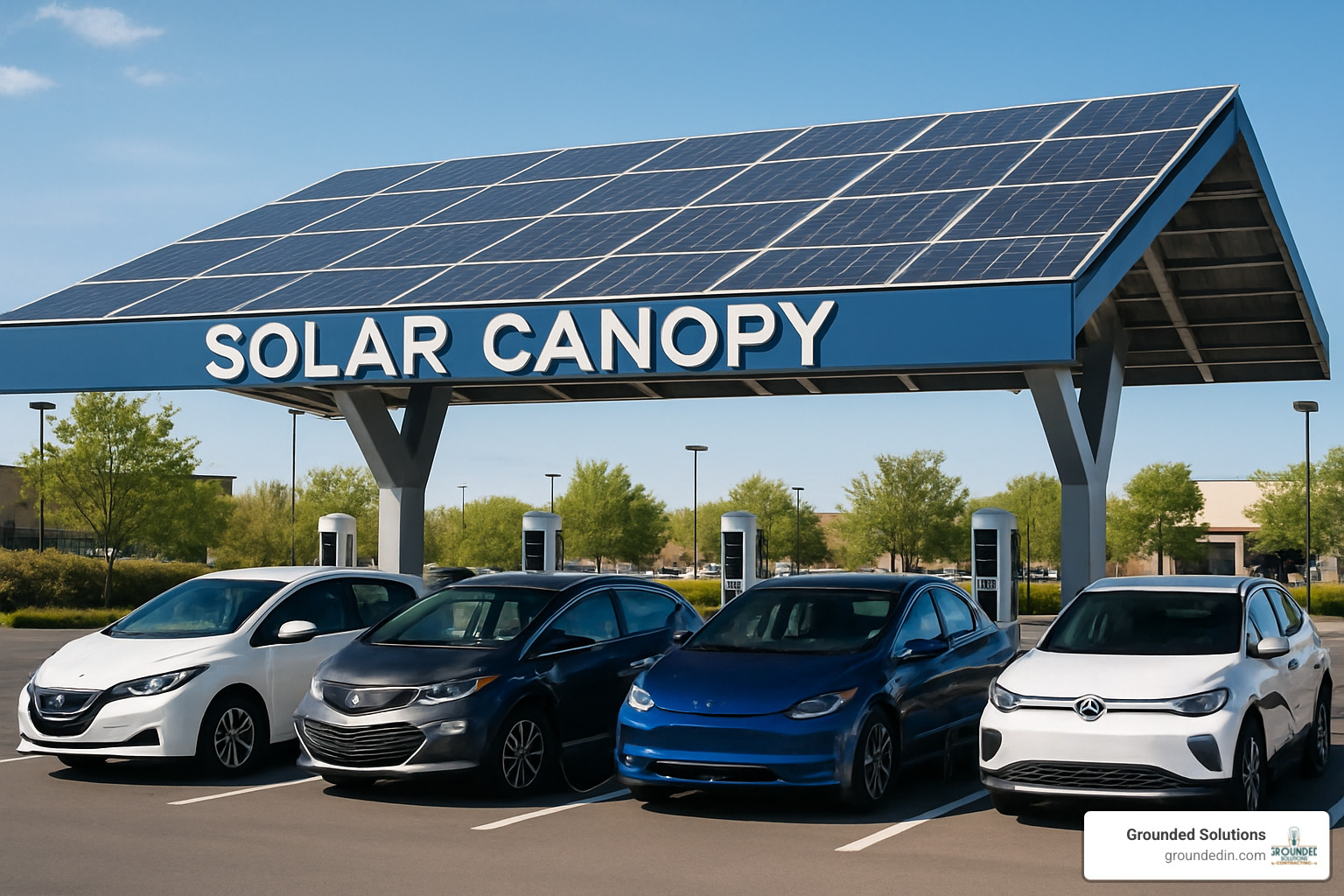
Solar integration provides weather protection for vehicles while generating clean electricity for charging operations. The federal tax credits for renewable energy systems can significantly improve project economics, especially when combined with EV charging incentives.
Battery storage systems offer peak demand shaving capabilities that reduce utility demand charges. During high-usage periods, batteries supplement grid power to prevent expensive demand spikes.
Incentives, Grants & Ownership Models
The financial landscape for EV charging projects has never been more favorable. Between federal tax credits, state rebates, and creative ownership models, smart property owners are finding that EV charging installations often pay for themselves faster than expected.
Federal programs offer the most substantial support. The 30% Investment Tax Credit applies to most commercial charging installations, meaning Uncle Sam covers nearly a third of your project costs. Accelerated depreciation schedules sweeten the deal further, allowing businesses to write off equipment costs quickly.
Here in Indiana, NIPSCO provides rebates for commercial charging installations, and various state programs support alternative fuel infrastructure. The Database of State Incentives for Renewables & Efficiency tracks current programs and eligibility requirements.
Ownership models have evolved beyond simple purchase decisions. You can own the system outright and keep all revenue, partner with charging networks through revenue-sharing agreements, or explore lease programs that minimize upfront investment.
Preparing Documentation for Funding
Grant applications and rebate programs require more than good intentions – they need professional documentation that tells your project’s story clearly and compellingly.
Start with your utility bills and load profiles. These documents prove your electrical usage patterns and demonstrate project necessity. We help clients compile 12 months of utility data that shows seasonal variations and peak demand periods.
Professional site plans and electrical drawings separate serious applications from wishful thinking. Cookie-cutter submissions rarely win competitive funding, but detailed engineering drawings show reviewers you’ve done your homework.
Monitoring ROI After Install
Installing chargers is just the beginning – ongoing performance monitoring reveals whether your investment is meeting expectations and where improvements might boost returns.
Usage dashboards show real patterns versus projected assumptions. We’ve seen installations exceed expectations by 200% and others underperform due to poor signage or user education.
Revenue tracking varies by ownership model, but every installation should monitor cost recovery progress. Smart billing apps and network management systems provide detailed analytics that inform future expansion decisions.
Frequently Asked Questions about EV Charging Station Contractors
When you’re ready to add EV charging to your Indianapolis property, you probably have questions swirling around in your head. After two decades in the electrical business and countless conversations with property owners across Central Indiana, I’ve heard just about every concern imaginable.
What qualifications and certifications should a contractor hold?
This is hands-down the most important question you can ask, and frankly, it’s where a lot of property owners get burned. You wouldn’t hire just anyone to rewire your building, so why trust your EV charging station contractors decision to someone without proper credentials?
Start with the basics – any contractor touching electrical work in Indiana needs current state electrical licenses. But here’s where it gets interesting: EV charging isn’t your grandfather’s electrical work. The technology changes rapidly, and the best contractors invest heavily in ongoing education.
Look for manufacturer certifications from the major charger companies. These aren’t weekend courses – they’re comprehensive training programs that cover everything from installation nuances to troubleshooting complex network issues.
Experience matters tremendously. Ask specifically about commercial electrical projects, not just residential work. The power requirements, permitting processes, and utility coordination for commercial EV installations are completely different animals.
At Grounded Solutions, we hold all required Indiana electrical licenses and maintain active manufacturer certifications. Our team regularly attends training programs because this industry evolves monthly, not yearly.
How long does a typical commercial installation take?
Here’s where I see a lot of unrealistic expectations. Some contractors promise impossibly fast timelines, then leave you hanging when reality hits.
The honest answer for most commercial projects is 8-12 weeks from contract signing to plugging in your first vehicle. Simple installations with adequate existing electrical capacity can happen faster, while complex projects requiring utility upgrades take longer.
The timeline breaks down into predictable phases. Permit approvals typically consume 2-4 weeks, and there’s not much anyone can do to speed up municipal review processes. Equipment procurement adds another 2-6 weeks, depending on what you’re installing and current supply chain conditions.
The actual construction and installation work usually takes just 1-2 weeks once we mobilize on site. Then you need another week for inspections and commissioning before everything goes live.
How do contractors ensure ADA compliance in parking layouts?
This question doesn’t come up as often as it should, but it’s absolutely critical. ADA compliance isn’t optional – it’s federal law, and the penalties for non-compliance can be severe.
Professional contractors design charging layouts that meet Americans with Disabilities Act requirements from the ground up. This isn’t something you bolt on afterward – it needs to be integrated into the initial design process.
The requirements go beyond just space dimensions. Yes, accessible spaces need to be wider with proper access aisles, but there are also requirements for charger height, cable management, payment system accessibility, and clear paths to building entrances.
We work with property owners during the design phase to identify appropriate accessible spaces and ensure charging equipment integrates seamlessly with required access routes. Compliance verification is built into our standard design process – not an afterthought.
Conclusion
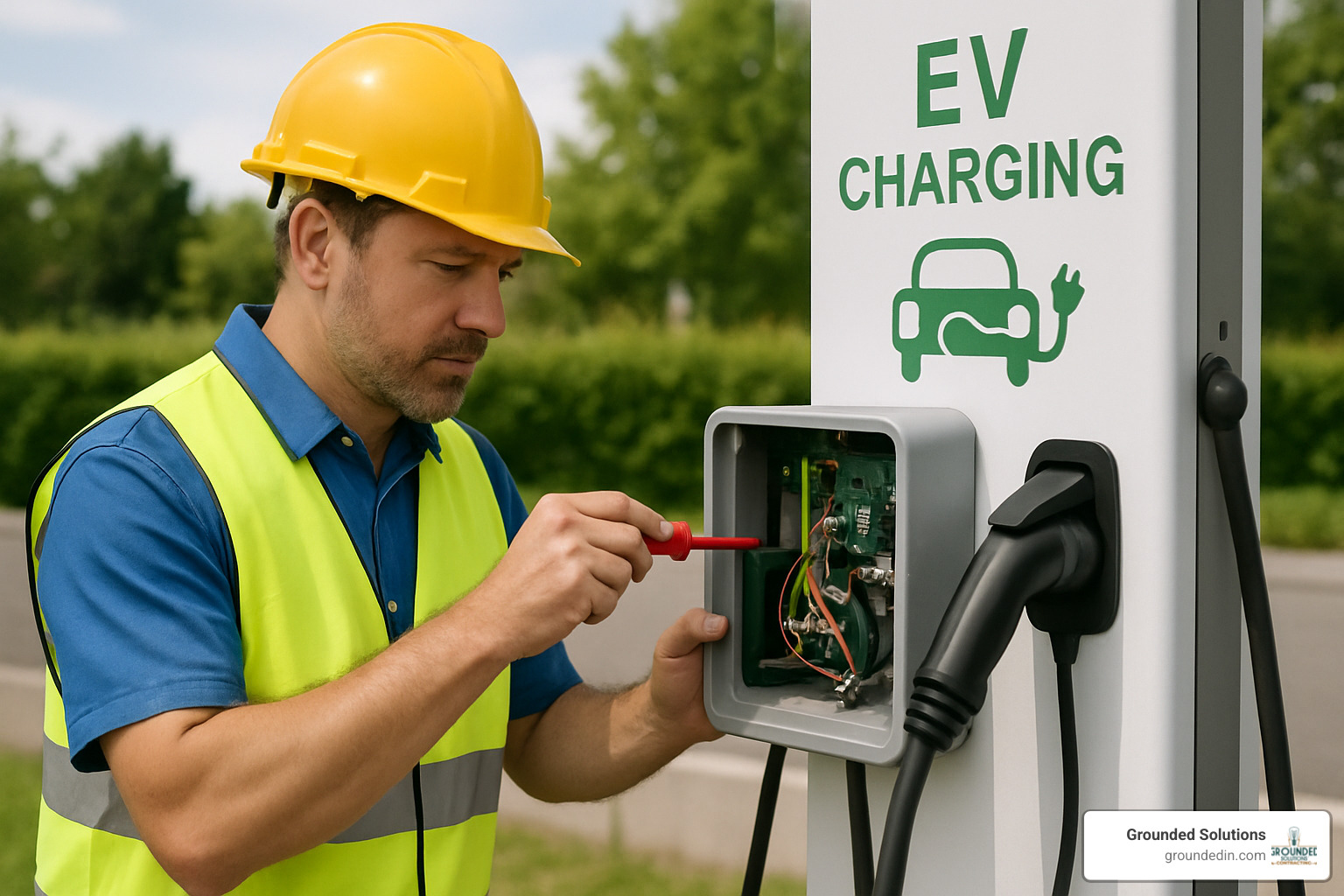
The electric vehicle revolution is happening right here in Central Indiana, and the properties that get ahead of the curve will reap the benefits for years to come. But here’s the thing – EV charging station contractors aren’t all created equal, and the difference between a great installation and a problematic one often comes down to experience, attention to detail, and genuine commitment to getting it right.
We’ve walked you through everything from site assessments to ongoing maintenance, from Level 2 workplace charging to DC fast charging for retail locations. The thread running through all of it? The importance of working with contractors who understand both the technical complexities and the business realities of EV infrastructure.
At Grounded Solutions, we’ve been serving Central Indiana families and businesses for over two decades. We’re not just another electrical contractor who decided to jump on the EV bandwagon – we’re licensed, bonded, and insured professionals who’ve built our reputation on doing things right the first time.
Our family-owned approach means you’re not just another project number. When we assess your site in Carmel, coordinate permits in Fishers, or commission your new charging system in Westfield, you’re working with people who live and work in these same communities. We understand the local permitting quirks, we know the utility representatives, and we’ve built relationships that help your project move smoothly from first sketch to ongoing service.
Whether you’re planning a simple Level 2 installation for employee charging or a complex DC fast charging hub with solar integration, we manage every detail. From trenching and bollards to network configuration and branding, our turnkey approach means one phone call, one contract, and one team accountable for your success.
The best part? We’re ready to electrify your lot today. Central Indiana’s electric future is bright, and we’d love to help your property be part of that story.
Don’t let your property fall behind in the EV revolution. Contact Grounded Solutions now to schedule your comprehensive site assessment and find how professional EV charging installation can transform your business. Call us today or visit our website to take the first step toward becoming Central Indiana’s next EV charging destination.
More info about our turnkey EV services shows how we handle every aspect of your EV charging project – because that’s what Indy’s trusted EV charging experts do.
